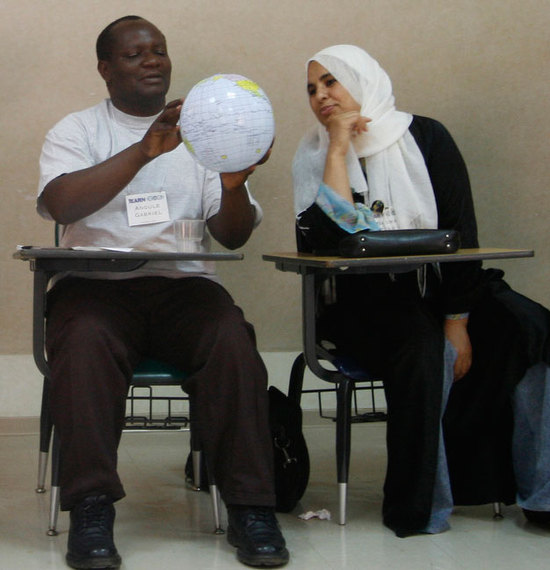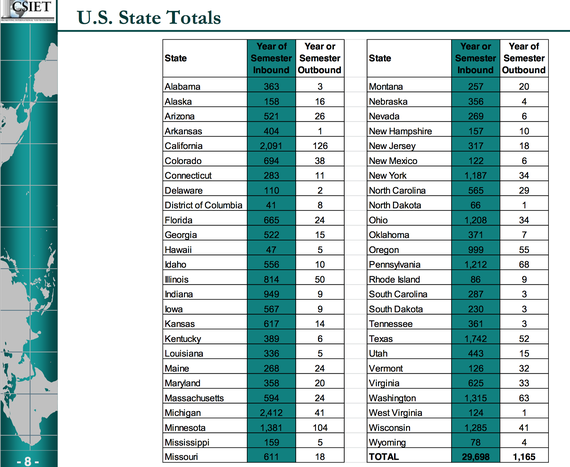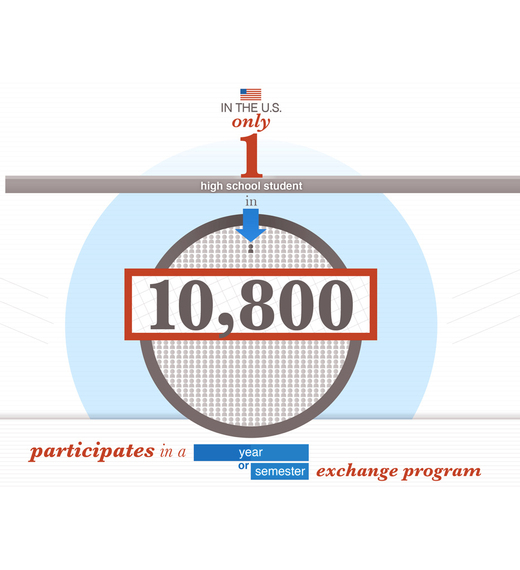I'm one of the privileged few. I had the chance to travel abroad as an exchange student at the age of 17 during a "gap" year between high school and college. That year changed my life and set me on a career path in the field of global education.
I'm privileged because research now indicates the benefits of such experiences in subsequent career options. For example, William W. Maddux, et al, found in a longitudinal study that:
The psychological approach individuals take when immersed in a general multicultural environment can predict subsequent career success. Using a culturally diverse sample, we found that "multicultural engagement"--the extent to which students adapted to and learned about new cultures... predicted the number of job offers students received after the program, even when controlling for important personality/demographic variables ... People who have international experience... are better problem solvers and display more creativity...What's more, we found that people with this international experience are more likely to create new businesses and products and to be promoted.
Wow. I stand a better chance of getting a job because I went abroad for a year and I'm more likely to get promoted. I love it.
If that's not enough, Angela Ka-yee, et al, found in their study that:
...exposure to multiple cultures in and of itself can enhance creativity. Overall, the authors found that extensiveness of multicultural experiences was positively related to both creative performance (insight learning, remote association, and idea generation) and creativity-supporting cognitive processes (retrieval of unconventional knowledge, recruitment of ideas from unfamiliar cultures for creative idea expansion). Furthermore, their studies showed that the serendipitous creative benefits resulting from multicultural experiences may depend on the extent to which individuals open themselves to foreign cultures.
Just when I was feeling so proud of my success and celebrating my creativity, I learned that Christine S. Lee, et al, also conducted a study to give me reason to celebrate even further. They found:
...students who studied abroad outperformed the two groups of students who did not study abroad on both the general and culture specific measures of creative thinking....studying abroad supports complex cognitive processes that underlie creative thinking in culture specific and domain general settings.
Faced with this research, it occurred to me that all 20 million U.S. high school students should have the chance to study abroad. And looking at the strategic plan for internationalizing US education published by the US Department of Education, that is exactly what is being suggested.
BUT WAIT, the Council on Standards for International Educational Travel (CSIET) recently published its annual statistics on the number of US students who go abroad in 2012-2013 for a semester or one year and they could find less than 1,200 in all 50 states. I had no idea how privileged I was: .006% of US high school students.
BUT WAIT, if research shows that an international experience gives a significant leg up in job searches, promotions and creativity, is it fair that so few get the chance? And if an average study abroad experience costs $5,000 (it's actually higher), then it would cost our country almost $100 trillion to send all of our current high schools students abroad. Not likely.
So, technology must be part of the solution. The International Education and Resource Network (iEARN) and its partners in the exchange 2.0 Coalition are working to make that a reality by modeling technology-enabled international interaction and developing tools for teachers to use to ensure that ALL young people in the US have the same equal chance at options and creativity. Further, technology-enabled volunteer opportunities are being explored or implemented by the Global Campaign for Education-US, United Nations and other organizations. Can you imagine if we enlisted the Peace Corps in this effort so that millions of US citizens could have an international voluntary service opportunity?
In the recent "Profile of Contributions from Connected Educator Month 2013" report, sponsored by the Office of Educational Technology at the US Department of Education, teachers noted that global connections for students were enhanced tremendously through collaborative social learning. Through Twitter and TweetChat sessions, "they are able to virtually connect with the authors of books they have studied and connect with student counterparts in other geographical regions."
What if the Office of Educational Technology facilitated the development of programs for all US high school students through its Connected Educators? Wow. Now we're talking.
I hope you'll throw out some additional ideas on how to ensure that ALL Americans have an opportunity for enhanced career options through meaningful cross-cultural experiences. Now's also the time to demonstrate what those experiences have done for all of us who have had them.


